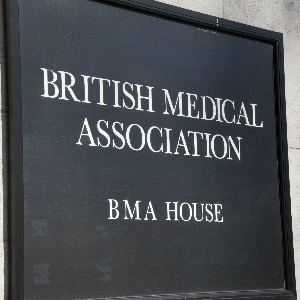BMA launches campaign to highlight rising pressure on GPs

The BMA has targeted patients in its next step to highlight the ‘unprecedented pressure’ GPs are under in a new campaign that will see practices displaying posters, literature and other materials, it announced today.
As part of the ‘Your GP Cares’ campaign, the BMA aims to get the public on board to push politicians to put funding towards attracting new GPs, retaining leavers and expanding overall GP numbers; expanding practice nurse workforce; and also pay for premises upgrades.
At the same time, the GPC will be stepping up lobbying efforts to ensure MPs are aware of practices that are at risk of closure due to funding swings such as MPIG cuts.
The RCGP has heralded the campaign, stating it is ‘standing shoulder to shoulder with our BMA colleagues to fight this growing chasm between funding and workload’.
Writing in Pulse, GPC negotiator Dr Dean Marshall said: ‘General practice is under unprecedented pressure with many practices on the verge of breaking point. This is the reality that GPs are facing and this is why today the BMA has launched its new campaign, Your GP Cares, which is calling for the sustained investment that GP practices need across the country.’
‘A key part of the campaign will be to highlight to the public the real obstacles that are getting in the way of GPs delivering the care that patients want expect. Many of these are already becoming apparent to patients although politicians and policy makers continue to ignore them.’
Related articles
Dr Dean Marshall: ‘Patients are beginning to realise their local practice is under strain’
Half of GPs support industrial action over future below-inflation funding awards
GPC chair Dr Chaand Nagpaul said: ‘I, and all other GPs, care immensely about our patients, and feel dismayed by the constraints impacting on services and undermining our ability to do the best for them.’
‘The environment in which we work is becoming increasingly challenging. GPs across the country tell us they are constantly fire-fighting to provide the services their patients need, leading to exhaustion and stress.’
He added that general practice is experiencing a workload crisis, while there has been a ‘steady decline in the state of GP buildings and some practices facing closure from funding cuts’.
‘It is time we addressed these issues head on, which is why our campaign aims to bring to people’s attention the true picture in general practice, and calls for the investment needed in GPs, practice staff and premises so we can deliver the care our patients deserve,’ he said.
The RCGP said it would work with the BMA to bring about more investment in primary care.
Dr Maureen Baker, chair of the RCGP, said: ‘The BMA’s “Your GP Cares” campaign complements the college’s own “Put patients first: Back general practice” campaign and we are pleased that the BMA is joining us to highlight the very real pressures facing our profession – and the risks to our patients – and to call on decision makers to take urgent action.’
‘We stand shoulder to shoulder with our BMA colleagues to fight this growing chasm between funding and workload. We hope that by working together, we will ensure that general practice receives the resources it needs to keep the NHS sustainable and deliver the care that our patients need and deserve.’
However, grassroots GPs questioned whether the campaign will achieve its aims.
Dr Andrew Mimnagh, a GP in Sefton and the former chair of Sefton LMC, said: ‘It is a bit of a long term strategy. I can’t see it giving a huge amount of room for manoeuvre. I am in favour of honest dialogue with the patients but [I don’t know if it] would produce a seachange soon enough. I suppose as we are pre-election it has never been a better time to raise this as a topic for debate, but it is not a direct level of power, is it.’
Dr Tracey Vell, honorary secretary at Manchester LMC, said: ‘Obviously any campaign lobbying MPs to fund more GPs and practice nurses and to update premises would always be a favourable move, but it is not just an increase in funding for attracting GPs [that we need] – we need to make primary care a more attractive place to work in. Currently morale is low, stress levels are high and pay is decreasing.’
The campaign comes after the GPC last year published a policy paper calling for improved resourcing, extension to GP training and premises upgrades.
RCGP launched its ‘Put patients first: Back general practice’ campaign in April, calling for general practice to receive 11% of the overall NHS budget, and Pulse revealed last week that half of GPs would support industrial action if awarded another lower-than-inflation funding uplift.
Pulse October survey
Take our July 2025 survey to potentially win £1.000 worth of tokens










